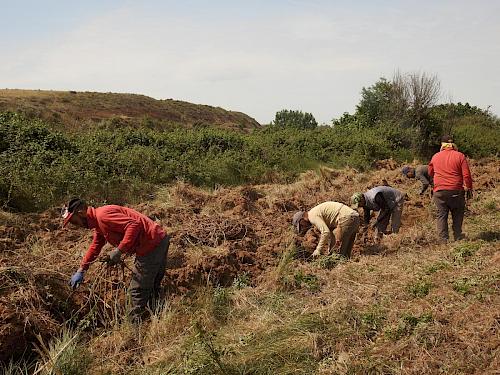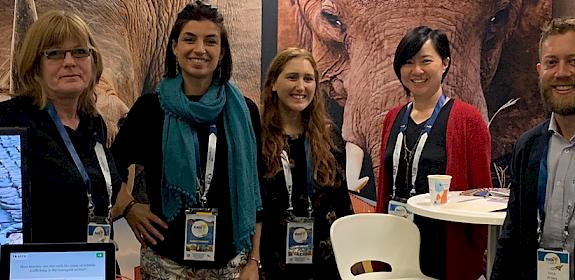Effective regulation and management of wild species of fauna and flora needed to strengthen biodiversity and health links
Cambridge, UK: 8th June 2021 - The current COVID-19 pandemic has put the spotlight on wildlife and the potential role of wild animals in the transmission of zoonotic disease, highlighting the intimate link between human, animal and environmental health. As Parties to the Convention on Biological Diversity (CBD) meet today to discuss the issue of biodiversity and health, TRAFFIC urges that serious attention be given to the urgent need to regulate, manage and monitor harvesting, trade, and use of all wild species of fauna and flora to ensure it is safe, sustainable, and legal.
The 24th meeting of the CBD’s Subsidiary Body on Scientific, Technical And Technological Advice (SBSTTA 24) will discuss a draft global action plan to mainstream biodiversity and health linkages into national policies, strategies, programmes and accounts. Among the action areas identified in the Action Plan is mainstreaming biodiversity and health linkages in wildlife management (Action Area 2.2.2.), incorporates activities to “ensure all exploitation, including harvesting, hunting, fishing, trading and using of wild species is regulated and ensure practices, including in communities that depend on such practices for their livelihood, are legal, sustainable and safe.”

TRAFFIC’s Director of Policy Sabri Zain said that monitoring and stringently regulating the currently legal wildlife trade, including that related to ranching and captive breeding of wild animals, is essential to ensure that any trade that is allowed does not pose a risk to human or animal health or the survival of the species in the wild.
Fundamental criteria of legality and sustainability must be met, underpinned by traceability or certification, as appropriate, that follow scientifically-agreed guidelines on human and animal health and well-being and biodiversity protection.
In April, the World Health Organisation (WHO), World Organisation for Animal Health (OIE) and UN Environment Programme published Interim Guidance on ‘Reducing public health risks associated with the sale of live wild animals of mammalian species in traditional food markets’. The Interim Guidance recommended that suspension of trade in ‘live caught wild animals of mammalian species for food or breeding purposes’ and the closure of ‘food markets selling live caught wild animals of mammalian species’. However, the Interim Guidance specifies this as ‘an emergency measure unless demonstrable effective regulations and adequate risk assessment are in place’.
“Adoption of tough restrictions is an understandable precautionary response to reduce the risk of zoonotic disease transmission in the midst of an active global pandemic, particularly in local or national situations where trade in wildlife is illegal or poorly regulated,” Zain said. “However, it must be emphasised that these are indeed emergency measures and, as specified in the Interim Guidance, should be of a temporary nature, with time-bound regulations specifying the date and specifying the conditions – including adequate regulations, risk mitigation measures and enforcement – when they no longer apply.”
Rather than blanket bans, the long-term solution to managing the risk of zoonotic disease transmission from wild animals and combatting illegal, unsafe, or unsustainable practices is likely to be highly context-specific. Critical control points for disease risk management need to be identified in wildlife supply chains and support existing efforts on regulation, management and monitoring of the harvesting, trade and use of wildlife.
“At the same time, adequate regulations that build upon the respect of good customary practices will benefit the social and conservation nexus of those societies that sustainably use and trade wildlife,” Zain added. “Such regulations require sound guidance and consultation with stakeholders to develop, standards, together with deployment of tools for assessment and management of risk, combined with effective enforcement and monitoring measures.”
Last October, the members of the Collaborative Partnership on Sustainable Wildlife Management (CPW)1, which includes TRAFFIC, published a joint statement. The statement set out guiding principles aimed at reducing the risk of future pandemics originating from wild animals while strengthening the conservation of wildlife, and at the same time, respecting livelihoods, food security and the culture of diverse groups of people. “It also underlines the need for countries to regulate, manage and monitor harvesting, trade and use of wildlife to ensure it is safe, sustainable and legal,” Zain added.
Zain noted that the CBD’s draft global action plan to mainstream biodiversity and health recognised the need to promote the sustainable use, management and trade of plants and animals used in traditional medicine (Activity 2.3.2). For example, thousands of consumer products contain ingredients from wild-harvested plants, with trade tripling in the last decade. This is being driven by expanding natural ingredient markets, including demand for alternative treatments for COVID-19.

Around 26,000 plant species have well-documented medicinal uses globally. Approximately 3,000 are traded internationally, the majority (60–90%) believed to be wild-collected, underpinning traditional medicines and other health products. One such species likely to be experiencing increased use due to COVID-19 is wild Liquorice (Glycyrrhiza spp) root, which has seen a rapid increase in demand as a widely-used health product ingredient. Incomplete data on trade in wild plants and insufficient uptake of sustainable management practices for these species threaten livelihoods, health, plant diversity, and habitats.
Without steps to ensure good regulation and sustainability practices, this increasing trade will place more pressure on populations of wild-collected plants, which could lead to unsustainable levels of trade that endanger species and livelihoods of rural communities who harvest the plants.
TRAFFIC supports the activities emphasised under Action area 2.3. Mainstream biodiversity in health sector in this regard. TRAFFIC has supported CBD Parties by developing and implementing best-practice standards on sustainable wild-harvesting of medicinal and aromatic plants, the FairWild StandardMany case studies portray the successful implementation of sustainable wild-harvesting practices for use in health products. For example, the harvesting of an important Ayurvedic medicine ingredient Bibhitaki (Terminalia bellirica), in the Western Ghats area of India, benefitting wild trees, people, and wider landscape conservation efforts, and the harvesting of Jatamansi (Nardostachys grandiflora) in the high-altitude Himalayan range of Nepal. Key priorities are developing a better knowledge base, trade monitoring, and implementing sustainable management practices for these key ‘hidden’ ingredients.
Wildlife trade encompasses a wide range of species and products, contributing to human health through food, medicine and health ingredients, construction materials, clothing and more. With the recent global assessments identifying overexploitation by people as the key driver of species loss, the stark focus of the attention of the CBD Parties needs to be on ensuring that wildlife trade is sustainable, legal and bring about benefits to conservation, health and livelihoods. “TRAFFIC applauds the draft Global Action Plan for Biodiversity and Health and urges its adoption and implementation,” Zain said. “TRAFFIC stands ready to contribute to its effective implementation, alongside the post-2020 Global Biodiversity Framework”.
TRAFFIC’s work at the intersection of wildlife trade and disease risk mitigation recognises that solutions must be evidence-based and multi-faceted to address these complex challenges. The USAID Wildlife TRAPS project, implemented by TRAFFIC in partnership with IUCN, explores the strengthening and adaptation of existing systems-based approaches to supply chain management and traceability to mitigate potential disease risks at various wildlife trade interfaces. Recognising that shifts in human behaviour are fundamental to risk mitigation, TRAFFIC is also developing pilot social and behaviour change messaging to target wildlife consumers and other key actors from source to market.
Further information and notes:
Wildlife trade, COVID-19 and zoonotic disease risks: shaping the response
Bushmeat Trade in urban centres in Tanzania
1. The CPW is a voluntary partnership of 14 international organisations, including the Secretariats of the CBD, Convention on International Trade in Endangered Species of Wild Fauna and Flora (CITES), World Organisation for Animal Health (OIE), Food and Agriculture Organization (FAO), as well as NGOs such as TRAFFIC. The CPW was established to promote the sustainable management of terrestrial vertebrate wildlife in all biomes and geographic areas, contributing to the conservation and sustainable use of biodiversity and human food security and livelihoods.
The CPW principles stress the importance of maintaining and restoring healthy and resilient ecosystems to reduce risks of zoonotic spill-overs and future pandemics while recognising the importance of the use of wildlife for many communities, including Indigenous Peoples and Local Communities in policy responses,” Zain said. “It also underlines the need for countries to regulate, manage and monitor harvesting, trade and use of wildlife to ensure it is safe, sustainable and legal.
2. An estimated 26,000 plant species have well-documented medicinal uses globally. Around 3,000 of them are traded internationally; the majority (60–90%) of these plants ingredients are wild-harvested. The future availability of plant ingredients to support human health—through medicines, food and well-being products—is dependent on prioritising the conservation and sustainable use of their source species in the long term.
The value of the global trade in medicinal and aromatic plant species has almost tripled in recent years (from $1.3 billion in 1998 to $3.3 billion in 2018), based on the latest available UN Comtrade data. The world’s top exporters are China, India, Germany, the USA and Hong Kong SAR, while the USA, Hong Kong SAR, Germany and Japan, are the top importers.
TRAFFIC is implementing a range of projects to support sustainable, legal wild plants trade, including the engagement of stakeholders in consumer markets through partnerships and initiatives such as FairWild, AGA (Action Campaign for Endangered Species), the German Postcode Lottery, and the Swedish Postcode Foundation.




